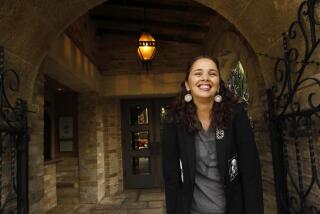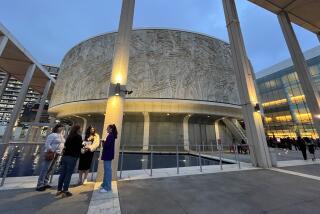Recalling an Influential, Avant-Garde Director : Theater: Memorial at the Mark Taper Forum honors Reza Abdoh and his work’s ‘precedent- shattering impact.’
- Share via
A subdued crowd of approximately 250 gathered at the Mark Taper Forum on Thursday for a memorial in honor of avant-garde theater director Reza Abdoh, who died May 11 in New York of complications of AIDS.
An image of Abdoh’s face--with its chiseled features, dark eyes, heavy brows and full lips--was projected onto the back wall of the set of the current production of Terrence McNally’s “Master Class.” On a stage adorned with a single arrangement of tall sunflowers, friends, family, colleagues, members of Abdoh’s Dar A Luz production company and others took turns recalling the late 32-year-old’s artistry.
Taper artistic director Gordon Davidson opened the midday gathering, saying that he “treasured . . . what this extraordinary man did and the contribution he made to the theater.” Stage director David Schweizer followed, citing Abdoh’s “short, meteoric life . . . here, where the precedent-shattering impact of his theater showed our community at . . . its most involved.”
As demonstrated by a video compilation of excerpts from Abdoh’s works as well as interview footage, the Persian Italian auteur established himself through aggressively iconoclastic and often controversial plays that fell under the rubric of “theater of spectacle.” He garnered a reputation in the theater community as one of today’s most innovative artists, an heir, according to Schweizer, “to the legacy of Robert Wilson, the Wooster Group and others.”
Raised in England and influenced by the work of such contemporary stage figures as Peter Brook and Wilson, Abdoh was directing theater works by age 14. He studied dance and went on to develop a signature style undergirded by his prescient awareness of the moral relativism of society in decay.
His striking visuals ranged from bleakly Beckettian to postmodern urban baroque and were likely to include such jarring components as sadomasochistic motifs and a chorus line of dancing naked men in combat boots. Soundtracks ranged from show tunes to classical music to “industrial” sound and even aural pandemonium. In the midst of this sensory maelstrom--with its witheringly provocative iconography--was Abdoh’s inquiry into the possibility of faith amid the bedlam.
A resident of Los Angeles throughout the 1980s, many of his works were staged here--including, most recently, the premiere of a workshop version of his “Quotations From a Ruined City,” as part of the 1993 Los Angeles Festival. He left for New York in 1991, after the demise of the resident company of the Los Angeles Theatre Center, which had produced some of his most controversial pieces, including “Minamata,” “The Hip-Hop Waltz of Eurydice” and “Bogeyman.”
On May 5, he was selected as one of the first five recipients of a $50,000 CalArts/Alpert Award in the Arts.
Diane White, who produced Abdoh’s LATC shows and continued to work with him in New York, said Abdoh accomplished “more than most people could hope to do in three lifetimes.”
Actor Tony Abatemarco, who had appeared in “Minamata,” paid tribute to the late director by donning the black pumps and long, gray wig he’d worn in that show. Gazing straight ahead, he sang “Beyond the Blue Horizon” while offering a salutatory parade wave--to those in the house, but perhaps more so to the memory of a singular talent silenced so young.
More to Read
The biggest entertainment stories
Get our big stories about Hollywood, film, television, music, arts, culture and more right in your inbox as soon as they publish.
You may occasionally receive promotional content from the Los Angeles Times.










